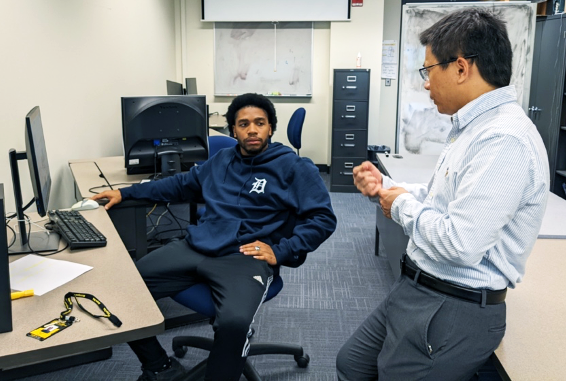
By James Townsend from the Institute of Computing and Cybersystems (ICC) news blog.
When we find ourselves continually shifting online, the need for safe and reactive storage systems is crucial to ensuring cyber security. Centralized cloud storage inhabits a larger space of people’s lives than they may realize, and is contained to a limited number of data centers throughout the world in which the effectiveness and efficiency of utilizing these systems changes based on proximity to these centers.
To combat this issue, decentralized cloud storage systems have arisen, making use of surplus space on personal computers to provide storage for those who have diminished accessibility to centralized cloud storage. These additionally reduce the cost of using often expensive data centers, but also raise questions about cybersecurity. A current solution for this issue is utilizing blockchain technology to audit data integrity in untrusted peers, which has efficiency challenges, resulting in reduced scalability.
Addressing these concerns at Michigan Tech is Bo Chen, Associate Professor of Computer Science. Well-versed in cybersecurity and cloud computing and storage, Dr. Chen aims to achieve greater data corruption detection to make all forms of cloud storage more feasible and prepared for challenges by utilizing trusted hardware components.
This research is a part of Dr. Chen’s National Science Foundation Grant totaling $598,416, entitled “SaTC: CORE: Small: Hardware-assisted self-repairing in decentralized cloud storage against malicious attacks.”
Using Intel SGX, Dr. Chen can work towards implementing necessary security measures in a trusted execution environment. This program can create an isolated memory region to execute processes that enable data corruption detection in an isolated environment from the rest of the program, protecting the process in the event that the operating system becomes compromised. This is called a Trusted Execution Environment (TEE).
The overall goal of this project is to design a self-auditing protocol within the data storage systems that detects local corruption, then repairs it automatically. By using the local solid state drive (SSD), containing the flash translation layer (FTL) along with the TEE as trusted hardware components, the auditing system can reliably ensure that the data within the SSD is unaltered and secure.
Preliminary implementation resulted in a prototype being installed in a Lenovo laptop.
This award extends until September of 2025. Zhenlin Wang is the sole co-PI for this project. Dr. Chen has two students assisting in the work, Josh Dafoe and Niusen Chen. Dafoe is an undergraduate student, and contributes to working on the design and implementation for the local data corruption detection, and expanding the solution to repair it correctly, while Chen is a PhD student, who assists in design formulation and providing additional code.
This research will undoubtedly be impactful in the field of cloud computing, bolstering cloud storage security. This result will in turn make cloud storage systems more accessible by achieving a more scalable and secure decentralized cloud storage system, which is currently the major concern regarding this type of cloud storage. Moreover, the self-auditing system will prove to be the first step for the hardware-assisted self-repair, identifying the problems for counteraction to be taken. The final goal of this project is to build a fully functioning secure decentralized cloud storage system with complete self-repair support.